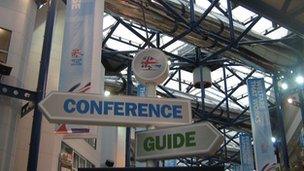Tory conference: John Redwood urges "moderation" from fellow Eurosceptics
- Published

Many Conservatives believes the UK's relationship with Europe is now at a crossroads
Conservative MP John Redwood has urged fellow Eurosceptics to "come together" and argue their case for a referendum using "moderate and sensible language".
Eurosceptics should "build not destroy bridges", he said, supporting a process of EU re-negotiation leading to a public vote after the next election.
And he hit out at the UK Independence Party, seen as a threat to the Tories.
He said UKIP had no MPs and would have little influence however well they did at the 2014 Euro elections.
Speaking at a fringe meeting organised by the Bruges Group think tank, Mr Redwood said despite recent speculation over the issue the government did not want an EU referendum in the current Parliament.
Those, like him, who wanted a so-called "in-out" referendum had to accept the "political reality" that the leadership of all three main parties were against putting the issue to the public in the foreseeable future.
"I don't think there will be a referendum before the next election unless some very big event on the continent changes everything," he said.
'True doctrine'
But he suggested the government's position had shifted and ministers were now talking of re-modelling the UK's relationship with Europe.
It was the duty of Eurosceptics to help "flesh that out", he suggested, and help produce a "better deal" that could then be put to the British people for their consent.
As this important juncture in Europe, he warned against internal divisions within Euroscepticism which he said only played into their opponents' hands.
"Eurosceptics take great delight in beating each other up, criticising each other and trying to form ever purer groups to put forward the true doctrine.
"Eurosceptics must try to win over those who were "broadly in sympathy" with their cause but who were put off by the "apparent extreme language some use and the extreme conduct that some undertake...We need to build bridges rather than destroy them."
He added: "Now is the time for Eurosceptics to come together and stop arguing about what group or sect they belong to...Now is the time to set out the case in moderate and sensible language."
Asked about the prospect of the Conservatives and UKIP co-operating at the next election, Mr Redwood said that "given the leaders of the two parties that's not looking very likely at the moment".
Some Tory MPs fear the apparent surge in public support for UKIP will be enough to rob their party of an overall majority at the next election and UKIP leader Nigel Farage has floated the possibility of an electoral pact - if David Cameron agrees to an in/out referendum.
But Mr Cameron has dismissed such talk, describing UKIP as a "waste of time".
'Fooling themselves'
Professor Tim Congdon, UKIP's economic spokesman, said Mr Cameron's promise to stand up for British interests in Europe - including his guarantee of a vote on the Lisbon Treaty - had turned "to jelly".
"The referendum has to be in or out. If David Cameron and William Hague think by promising a referendum after the election on some silly little negotiation they have had and that is somehow going to neutralise UKIP then they are fooling themselves as well as the people".
Hurting the Tories at the ballot box was the best way to get a referendum, he said, adding his party "intended to cause as much damage as possible to other parties so they wake up and listen to the British people".
Eurosceptic Labour MP Gisela Stuart, who was also on the panel, said she would not be surprised if UKIP emerged as the largest party in the 2014 European elections.
Divisions on the right of the political spectrum over Europe may be good for her party but not for the wider question of the UK's future.
She told the meeting some of her colleagues thought she was "bonkers" and "questioned her sanity" for appearing at the Tory conference but she insisted politicians had "got to start talking to each other".
"The people who are probably most guilty of not daring to think the unthinkable are the politicians themselves."